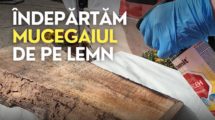I'm not going to do a dissertation on the significance of this holiday. I have neither the necessary knowledge nor training and I will refer to how Epiphany is celebrated in some countries. I will only tell you that it is a Christian holiday and in some countries it is linked to the baptism of Jesus (as it is in our country) and in others to the visit of the 3 Magi to Jesus after his birth. I tell you these details to help you understand why the celebrations and traditions of Epiphany are different.

photo source: hotel-fortuna.ro
Remember log burning on Yule log? In England, the night before Epiphany is the 12th night - the last night - that wood is burned. The remaining charcoal is kept in the house to protect it from fire and lightning, and the next Christmas it will be used to light a new log. The night before Epiphany is called Twelfth Night and is a night of jokes and pranks, as in Shakespeare's play of the same name, first staged in 1601. On this night, a very dense, typically English fruit tart is eaten with a bean hidden inside. Whoever finds it will be king all day. Any spicy drink, such as ginger schnapps, is considered appropriate because it is reminiscent of the spices brought by the Magi. On Epiphany, a star-shaped cake is made to commemorate the star followed by the Magi. Sometimes, for good luck, it is covered with 13 different kinds of jelly in different colors.

photo source: waltzingm.com
In NetherlandsOn the evening of Epiphany Eve, children in groups of 3, symbolizing the 3 Magi, go trick-or-treating from house to house and receive small coins or sweets. Sometimes they take paper lanterns with them to symbolize the star followed by the Magi. There are also competitions between groups, with the children singing carols in front of an audience. On Epiphany, an almond cake called Koningenbroot (kings' bread) is baked with a black bean. Whoever finds it is designated king for a day.
In Spain and Central American countriesChildren polish their shoes and prepare them in the same way we do for Santa Claus. The next day, those who behave will find gifts in their shoes, brought by the Magi. Those who have not been so obedient receive coal, actually pieces of black candel sugar, called. In the past children only received gifts on this day, not at Christmas. Now, thanks to the "globalization" of Christmas, they receive gifts on both days. Also on Christmas Eve, in many towns and cities there are colorful parades to show the arrival of the Magi. In Alicante, Valencia, this custom, which began in 1885, is still kept.

photo source: ibtimes.co.uk
In Germany Groups of children or young people, dressed as magi and holding a painted wooden star, go from house to house to make wishes. They receive sweets as well as donations for various good causes. On Epiphany, such groups also go to the German Chancellor or the German Parliament to make wishes.
They also bake special cakes in the shape of a star or a crown, decorated with candy and with an almond or a small figurine inside. Whoever finds it is king of the day and wears a paper crown that always accompanies the cake. Here it is said that if winter has not come by Epiphany Eve, it will not come again, or if on Epiphany Eve it is clear and clear, then it will be a very good year for wine.

photo source: ibtimes.co.uk
In Italy Christmas Eve is linked to the name Befana (derived from Epiphany), an old woman who comes riding on a broom to bring gifts to good children or coal to naughty ones. Legend has it that this old lady was unable to reach the baby Jesus to bring him gifts and has been bringing presents to all children ever since.
The Irish They call Epiphany the Little Christmas or Women's Christmas (Nollaig na mBan). On this day, women rest after so many days of feasting, cooking and spreading rich meals. In the past, women did nothing on this day and all the household chores, including eating and cleaning, were done by men, who also served them at the table. Now it is customary for women to go out to eat in restaurants. They also receive gifts from children, grandchildren or other family members. On Christmas Eve, it is customary to burn in the fireplace or stove, twigs from the Christmas tree or branches that have decorated the house on the feast days.
In Latvia it is said that those who weave or chop wood on Epiphany will have bad luck all year round. Here it is also said that if a young girl hears a dog barking on Epiphany, she should look in that direction for her chosen one.
In Romania, as in the other surrounding Orthodox countries (Moldova, Bulgaria, Russia), the feast is linked to the baptism of Jesus by John the Baptizer. On this day the waters are sanctified and it is customary for the priest to throw a wooden cross into a river, the Danube or the Black Sea, and for young people to jump into the water to retrieve it. Whoever finds it will be lucky all year.

photo source: skytrip.ro
In the cold areas of Bukovina, it is customary to make a cross out of the ice on the lake, which is cut with a chainsaw.
On Epiphany, horse races are organized in some areas. The horses and youngsters are blessed before the priest and sprinkled with holy water. It is a great honor for those who win the race, both horse and rider. All those who take part in this race will have good luck all year long. It is said that girls who fast on New Year's Eve and sleep with basil under their pillows will dream of their mates. Mamaia used to tell me that when she was young, it was customary to make a small loaf of bread, very salty, on New Year's Eve, and eat it before going to bed, to dream of her future husband, who would come to give her a cup of water.
As I said, Epiphany is the feast that ends a beautiful holiday season. In our country, immediately after Epiphany comes St. John's Day, which is the occasion on which a lot of Romanians celebrate their name day. So we extend the holiday period by another day. But after that, that's it, we all start work (those who haven't started already). And we'll be back with articles on wood species, materials and finishing methods, wood-related curiosities, wonderful people in love, like us, with all things wood. Let's all have a good year!




































Hello and happy birthday!I appreciate your articles.
Happy Birthday! Thank you for your appreciation.
Happy New Year! The burning of the bustean is the 12 holy nights between Birth and Baptism. John's Baptism represents Christ's descent into the body of Jesus of Nazareth, to live and die as a man, the only way he could enter the Kingdom of Death and to celebrate the Sacrament of Calvary. The grandson of the great composer gives details of these nights https://www.universenciclopedic.ro/cele-12-nopti-sfinte-si-ierarhiile-spirituale